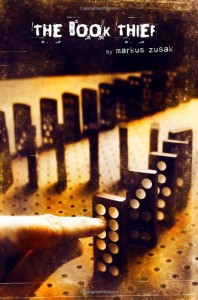6
Followers
6
Following
The Review Man
Formerly of Goodreads, now of both words, in the coming times only here?
Currently reading
Survival: A Thematic Guide to Canadian Literature
Lila: An Inquiry Into Morals
Simulacra and Simulation (The Body, In Theory: Histories of Cultural Materialism)
Leaven of Malice
The Salterton Trilogy
Effi Briest (Penguin Classics)
Empires of the Word: A Language History of the World
Cases And Materials On The Law Of Torts
Public Law : Cases Materials and Commentary
A Property Law Reader
 When Death shows up at the end of Woody Allen's fantastic 1975 comedy Love and Death, it's funny. For one thing, it follows a scene in which Allen rather brilliantly satirizes Bergman's Persona, as such slyly informing the viewer that his entrance is played for laughs. (Interestingly enough, death was an important theme—and sometimes a character too—in Bergman's films.) But more importantly, Woody Allen proves that he's not really taking himself seriously. There's something about the juxtaposition of eternal damnation and Woody Allen's bumbling, neurotic Boris that's inherently hilarious. (How I wish he would return to these heights instead of pumping out drivel like To Rome With Love... but that's another story.)
When Death shows up at the end of Woody Allen's fantastic 1975 comedy Love and Death, it's funny. For one thing, it follows a scene in which Allen rather brilliantly satirizes Bergman's Persona, as such slyly informing the viewer that his entrance is played for laughs. (Interestingly enough, death was an important theme—and sometimes a character too—in Bergman's films.) But more importantly, Woody Allen proves that he's not really taking himself seriously. There's something about the juxtaposition of eternal damnation and Woody Allen's bumbling, neurotic Boris that's inherently hilarious. (How I wish he would return to these heights instead of pumping out drivel like To Rome With Love... but that's another story.)Popular writer Marcus Zusak one-ups Woody Allen by having Death narrate the whole of his recent book The Book Thief. But Zusak's Death isn't played for laughs at all; in fact, he's a pretty sombre guy (if gender can be attributed to Death) who, for some inexplicable reason, really likes colours. The problem here is that everybody already knows that Death is scary. It's neither new nor noteworthy from a characterization perspective.
In Love and Death, Death acts as existential comic relief, which I contend is why his appearance is so successful. But Zusak will have none of that; no, he is in an oh-so-serious mood here. And there's nothing that screams Serious Fiction to hack writers more than a Holocaust Story, so take a guess how this book unfolds. Zusak's not content to stop there, though. Instead he manufactures a Shoah replete with assembly-line canned emotion for his own authorial benefit. What—is there a shortage of truthful World War II stories to mine? Is this where decades of drivel like Schindler's List have taken us? In 1955, Alain Resnais directed what I consider to be the quintessential work of art concerning the Holocaust, Night and Fog. Zusak's fiction does not deserve to sit on the same shelf as that masterwork.
The other issue with The Book Thief is the ending, which seems a little too similar to that of Gravity's Rainbow for my tastes. Perhaps it's homage or perhaps Zusak's never read that book or perhaps it's something else entirely, but at any rate it doesn't sit well with me.
Zusak's writing is weak, but I am hardly surprised, since the average modern author couldn't write a decent paragraph if you put a gun to their head. Ultimately, that is the highest praise that can be accorded Zusak: that he is merely average. He ought not to take solace in this statistic, however; "average" on Planet Earth has proven to be painfully mediocre.
I close with a quote from Love and Death:
And so I walk through the valley of the shadow of death. Actually, make that "I run through the valley of the shadow of death"—in order to get out of the valley of the shadow of death more quickly, you see.
Zusak doesn't run through the valley of the shadow of death; he lingers in it for 550 pages. Why should anyone be surprised that the result is so languorous?











